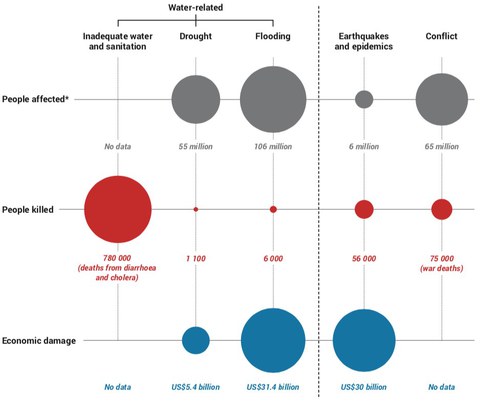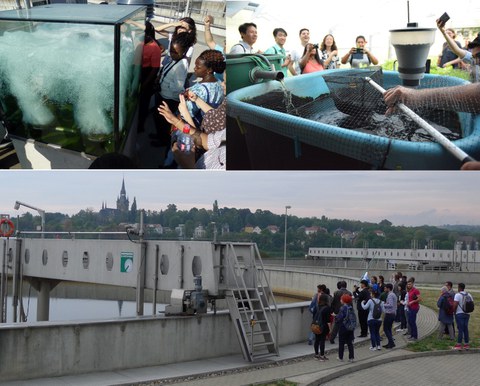80th UNEP/UNESCO/BMU International Short Course on Integrated Water Resources Management
Duration: 14 September - 09 October 2020
The consequences of the corona pandemic are affecting how we will conduct the 80th UNEP/UNESCO/BMU International Short Course on Integrated Water Resources Management (SC80). As it is highly uncertain, when international travel for all participants and classroom-based activities will be possible again, we have decided to conduct the training online and shift it to 14 September - 09 October 2020.
You can be sure we love to assemble environmental experts from all around the world for on-site exchange. That none-withstanding, in these extraordinary circumstances, we will prepare a high-quality online learning experience that will support a group of 21 experts in upgrading their knowledge and skills concerning IWRM in the best possible way. We will ensure that, also in this online edition, the exchange will be interactive with plenty of opportunities for learning from and with each other as well as from numerous facilitators covering all sectors from academia through governance. Besides knowledge and skills related to IWRM, participants will also be better prepared to harness the benefits of digital communication and learning - something of great value for many of your professional challenges ahead.
So what are the implications?
Application: Application period is closed. In case you have submitted your application, and will not be able to participate due to the shift in date or online format, please email us at: unep@mailbox.tu-dresden.de.
Selection and participation: With the help of our International Steering Committee, we will use the same procedure as usual to select 21 qualified professionals from around the world for this online opportunity. We will invite the 21 shortlisted applicants in June, to confirm their participation. The applicants' institution will also have to verify that you will be released from your duties to the same extent as if you would participate in an on-site course in Dresden. We will also inform additional experts on the waiting list. When you receive the invitation, please also prepare for an adequate technical set-up (i.e. access to a computer with good enough internet access, camera and headset), as this is a precondition for participation.
After successful completion of the training, you will of course receive a certificate detailing your achievements. You will also receive a fellowship of 550 € to support you with any additional expenses you might have had during the training.
ONLINE COURSE
Duration: 14 September - 09 October 2020
Motivation
Already over two billion people are living in countries affected by high drought stress or water shortages. About 4 billion people experience severe water shortages during at least one month per year. The demand for water will continue to increase by around 1% per year in the coming decades. Agriculture is already responsible for 69 per cent of water abstraction globally. There is also a big and growing need in industry and energy production. An increase in demand is brought about by population growth, socio-economic development and the associated expansion of urban water supply and sanitation systems. Concerning clean and permanently and easily accessible drinking water and sanitary facilities, there are considerable differences between and within continents, countries, municipalities and even city districts.
Climate change is likely to increase the mismatch between water supply and demand in the future. The frequency and intensity of flood and drought events are expected to change, with drastic effects on socio-economic conditions and the environment. Water quality continues to decrease due to the discharge of polluted wastewater and thus increases water scarcity, endangers human health and pollutes ecosystems -and thereby hinders sustainable development of the economy. Affordable supply and disposal options are urgently sought. A large part of the wastewater is currently discharged untreated worldwide. Improved wastewater management in the sense of a more circular economy holds great opportunities that must be exploited due to the increasing pressure on water resources.
To leave no-one behind, the 2030 Agenda for Sustainable Development pursues comprehensive goals going beyond water supply and sanitation. Sustainability Goal 6 is intended to ensure "availability and sustainable management of water and sanitation for all". Sub-goal 6.3 includes: "By 2030, improve water quality by reducing pollution, eliminating dumping and minimising release of hazardous chemicals and materials, halving the proportion of untreated wastewater and substantially increasing recycling and safe reuse globally.”

Average annual impacts of inadequate drinking water supply and sanitation, water-related disasters, epidemics and earthquakes, and conflicts
Achieving Goal 6 is central to the overall agenda, as there is a dynamic, two-way interdependence between Goal 6 targets and every other Goal. These interlinkages must be well understood and managed to achieve the social, economic and environmental dimensions of the 2030 Agenda. The achievement of SDG 6 is decided in countries with low and lower-middle incomes, where the share of water treatment and wastewater treatment is extremely low. Therefore, the need for cost-effective implementation solutions and options for safe water use is particularly high in those countries.
Course concept and objectives
In line with SDG 6 of the 2030 Agenda for Sustainable Development, the course contributes to building up capacities to protect, monitor and clean up the available water resources. The advanced training course addresses aspects of water quality and quantity with an integrated water resource management approach. Adequate legal provisions, robust political requirements and suitable technologies are considered.
Basis of the course is a well-founded understanding of the hydrological cycle. This includes natural and anthropogenic processes. Moreover, the course focuses on integrated, intersectoral measures for the sustainable use of water resources. The course program includes lectures, seminars, specialist visits and excursions on topics such as the water cycle, urban water (water infrastructure, water treatment, wastewater treatment), integrated water resource management and climate change, waterborne diseases and monitoring systems. The training also considers the sustainable use of wastewater and managed aquifer recharge. After completing the short course, participants should be able to actively contribute to the protection and improvement of water resources in their home countries.
Participants will also develop an action plan for a challenge in their field of work, applying the course contents and taking into consideration inspiration received from facilitators and fellows during the course. This plan shall be implemented autonomously upon return and thus facilitate the transfer of the newly acquired knowledge into the day-to-day activities.

Some impressions from the previous training on Integrated Water Resources Management
Target groups
This course is aimed at senior management experts who prepare and implement political decisions as well as decision-makers in ministries, authorities, local government and non-governmental institutions of developing countries (including newly industrialised economies) working on the protection of water resources. We expect a high motivation to explore concepts for integrated water resource management - as well as working towards implementing them. A first university degree (e.g. BA, BSc) in a related field (e.g. geology, geography, hydrology, meteorology, hydraulic engineering, planning, water management) is essential. Adequate communication skills in English language and the nomination by the delegating institution are mandatory.
Important note: Courses are full-time and attendance of lectures and excursions is compulsory. It is not possible to pursue regular employment at the same time. In the application process, we therefore request confirmation from the employer that the candidate is exempted from his regular duties for the duration of the course. We strongly advise against applying for the courses if the employer does not fully agree to the exemption from the job for the time of the course.
Application and participation
Our International Steering Committee selects the 21 participants of this course by July 2020. Participants stay in our comfortable private studio apartments and receive a stipend to cover basic living expenses. Flights, health insurance etc. will be provided. Our course office provides further manifold assistance. Participants successfully completing this course will be awarded a Certificate of Proficiency in Integrated Water Resources Management.
Download the overview brochure for the UNEP/UNESCO/BMU course program.
For more information on the application process, please visit the FAQ section.
